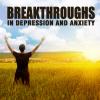It sems very interresting for the treatment resistant depressions, but I dont see anything that is beeing modulated for the normal depressions. So in my view its more like happy pill, although a promising one.
Furthermore it actually just overlaids the cause in inflammation related depression, without affecting the roots as well as usual antidepressants.
In other words, by just affecting the downstream targets, in contrast to herbs & natural compounds which are more likely capable to do so *
So depression is an inflammatory disease, but where does the inflammation come from?
http://www.biomedcen...741-7015/11/200
...However, clinical depression is accompanied by a “resistance” to these ex vivo or in vitro effects of antidepressants attenuating inflammation and T cell activation [14]. Moreover, remission of clinical depression is accompanied by a normalization of inflammatory markers [15], while lack of response is associated with persistently elevated levels of inflammatory markers [16]. This resistance to the immunosuppressive effects of antidepressants in depressed patients may be explained by chronic inflammatory processes, chronic damage by O&NS and the onset of autoimmune responses...
Inflammatory activation is associated with a reduced glucocorticoid receptor alpha/beta expression ratio in monocytes of inpatients with melancholic major depressive disorder
http://www.nature.co...tp2013118a.html
*
New drug targets in depression: inflammatory, cell-mediated immune, oxidative and nitrosative stress, mitochondrial, antioxidant, and neuroprogressive pathways. And new drug candidates--Nrf2 activators and GSK-3 inhibitors.
http://www.ncbi.nlm....pubmed/22271002
Andrographolide activates the canonical Wnt signalling pathway by a mechanism that implicates the non-ATP competitive inhibition of GSK-3β: Auto regulation of GSK-3β in vivo.
http://www.ncbi.nlm....pubmed/25423492
NeuroActin
The History of Andrographis
http://www.hpingredi...page=NeuroActin
which contains actually just an extract of Andrographis paniculata
..p-hydroxybenzyl alcohol (HBA), an active component of Gastrodia elata Blume..
p-Hydroxybenzyl alcohol prevents brain injury and behavioral impairment by activating Nrf2, PDI, and neurotrophic factor genes in a rat model of brain ischemia.
http://www.ncbi.nlm....pubmed/21347705
..Curcumin, the principal curcuminoid derived from the spice turmeric, influences several biological mechanisms associated with major depression, namely those associated with monoaminergic activity, immune-inflammatory and oxidative and nitrosative stress pathways, hypothalamus-pituitary-adrenal (HPA) axis activity and neuroprogression..
Curcumin for the treatment of major depression: a randomised, double-blind, placebo controlled study.
http://www.ncbi.nlm....pubmed/25046624
Effects of Scutellaria baicalensis Georgi on macrophage-hepatocyte interaction through cytokines related to growth control of murine hepatocytes.
http://www.ncbi.nlm....pubmed/16565440
If You are interrested in more informations:
Immunosuppression by NMDA-Receptor Antagonists is Mediated Through Inhibition of Kv1.3 and KCa3.1 Channels in T cells
http://mcb.asm.org/c...273-13.full.pdf
From inflammation to sickness and depression: when the immune system subjugates the brain
http://www.ncbi.nlm....les/PMC2919277/
Edited by Flex, 09 January 2015 - 06:29 PM.

















































